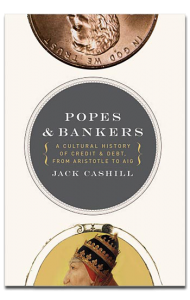Thursday

Book Review
Looking for a fun, if somewhat shotgun, financial history? Check out Jack Cashill's Popes & Bankers: A Cultural History of Credit and Debt, from Aristotle to AIG. I bought it on a whim at Barnes & Noble, based solely on its cover (a strategy, incidentally, which rarely disappoints). Whereas most commentary out there focuses on the evil of the system (and there's plenty of evil--a privation of goodness--in it), Cashill focuses on individual evil--a privation of the virtue of saving and restraint--without absolving the system. On a scale of 1-10, I give it an 8. Recommended.
Excerpt from the end of the book, after he has recounted the subprime meltdown and the MSM commentary surrounding it:
There was nary a word about the erosion of religious restraints, the cultural embrace of credit, the breakdown of the family, the media support for profligates, the government imposition of race and gender quotas on lenders, the consequences of land restrictions, the political pressures to put people in homes, the overrepresentation of single women in housing defaults, the sanctioned waiving of documentation, and the easy purchase of Congressional support by financial institutions, especially the government-sponsored enterprises [Fannie Mae, Freddie Mac, Ginnie Mae].
One quibble: I'm a nerd. I read the footnotes. Would publishers please (please, please) put the footnotes at the bottom of the page or, failing that, put them at the end of the book in a way that's easy to reference? This book puts the notes at the end and refers to the Chapter number, but not the name of the chapter, while the individual pages within the chapter have the chapter name but not the chapter number. It makes referencing the notes an annoyance.
